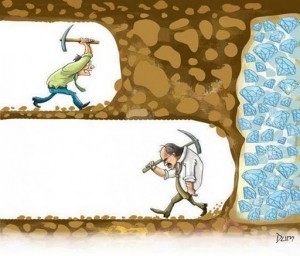Recovering from Sales Fatigue
Sales fatigue is a very real part of business. It’s not only something that faces large businesses with a highly trained sales force, it happens to entrepreneurs, too. Whether you’re a sole proprietor with a work-at-home business or a multi-national corporation, sales fatigue is one of the most important factors that can destroy your business’ bottom line.
I recently worked with a woman whose business had been faltering. She was getting to the point where the business was going to fail without some sales. She needed leads, and she needed to sell. However, she was finding a number of reasons why she couldn’t sell. She was inventing reasons why she had to avoid doing the one thing she needed most: get back to selling her product. Small, minor issues were turned into major problems that precluded her from picking up the phone and calling a prospect.
I had another coaching client who was having a hard time getting a new business off the ground. When I asked about the sales processes, he said, “I’m not a salesperson. It’s not who I am.” He was focusing on creating systems and fantasizing about what was possible, but over the course of months, there was not a single customer.
And yet another client who was a salesperson who was considering a career change because his sales kept going down. He definitely had sales burnout.
Does any of this resonate or sound familiar? In the shifting economy, these issues are all too familiar for many. We’re all being asked to refocus our abilities and claim our power much more regularly. If we’re not refocusing our efforts in a way that reclaims our passion, power, and determination, we hit a wall. We feel fatigue, burnout, and avoidance. It’s happening now more than ever.
Sales fatigue. We can get very burnt out telling the same story to prospect after prospect. We can get easily discouraged when we are rejected too many times. We can quickly start to doubt our business, our product or service, and even ourselves. We start looking for magic cures, fast sales, cutting corners, or excuses and reasons why we aren’t cut out for the goals we’ve set. If we don’t intervene with our negative thought processes and shift things around, we end up like this guy.

We are all salespeople. We are all selling all the time.
No matter who you define yourself to be, you are a salesperson. If you are in relationship with another human being, you are selling them on something.
Have a business? Employees? You are selling them on your business vision, your mission, and your passion. You are empowering them to work towards fulfillment of that vision.
Have a job? A boss? You are selling your boss on your abilities from the moment you send in your resume. Want a raise? Sell yourself.
Have a spouse? Having a hard time getting the garbage out to the curb? Sell him on why he should.
When I am hollering at encouraging the kids to get in the shower, or that it’s time for bed, or to get their breakfast cleaned up and get ready for school, I am a salesperson.
When I am encouraging a business partner to do something I’d like (or to give up on a bad idea), I am a salesperson.
We’re all selling. When we want it bad enough, when we’ve worked up our passion, selling is easy. But what about those times when our motivation and encouragement is lacking? What about those times when the kids didn’t get enough sleep and they don’t want to go to school? Or what about those times when the boss is having a bad day and the last thing you want to do is make the company some money? Or what about those times when you’ve heard “no” enough times for the day, and you just can’t hear it again? Or if you’re an entrepreneur and your bottom line is too frightening to even look at?
How do you sell when you feel like you just… can’t?
We often find ourselves in situations where we just cannot continue. It is easy to get burned out when we’re chasing a goal. And we can find ourselves seeing the trees instead of the forest. If we’ve just started a workout regimen, we hit burnout after a few weeks. It’s no longer fun. It seems like the work is way more than the reward.
And sometimes it’s true. The reward is far smaller than the effort required. It might make sense at that point to quit or do something else. However, when we give up on our goals and look at how easy it seems to be for others, we can talk ourselves out of the things we want.
These are the times when NLP (Neurolinguistic Programming) comes in very handy. Having a coach pinpoint the issues and help us get out of them is critical to success. Success in sales — which equates to success in business — boils down to a few core things:
- States. What state do you need to be in so that you can sell? What state do your customers need to be in so that they can buy?
- Strategy. How do you achieve and keep these states in all parties? What is your strategy for getting yourself — and your prospects — into these states?
- Resources. What resources do you have available for yourself to achieve the states required for a positive end result?
- Resilience. How well can you recover from unproductive states and get yourself back into a powerful sales-oriented state?
Part of the work I do with people — sales people, parents, entrepreneurs — is to find out what states are tripping them up, what states are giving them excuses. Are they trying to force themselves or their customers into an end result, or are they more effectively shifting states to make the sales process smoother? What are their strategies for identifying their blocks? What are their strategies for shifting out of blocked states? What resources do they have in their toolbox? How do they more effectively leverage those resources?
Here’s a few tricks for flipping into positive sales states.
Big picture. Long-term goal setting is great method for shifting states and harnessing resilience. Instead of focusing on one sale, the focus on a longer term goal makes hearing “no” easier. We’re always going to hear no. We’re always going to find prospects who aren’t a fit. But how do you manage the no so that you can be resilient and recover from the rejection? How quickly can you move from rejection to motivation? Looking at the big picture of the business gives us the ability to refocus on our product and service and do the work we need to do to serve the most people, and make the most impact to our business’ bottom line.
Service. Listening to a customer’s needs, wants, and desires gives us an idea of what makes them tick. It allows us to hear what it is that they think they want, and if we know our product or service well, we can also understand how our product and service can help them meet that want and the needs they don’t even know that they have. Sales becomes a service oriented activity that helps a prospect solve problems and create value for themselves and their organization.
Detatchment. I had one client who was so concerned with every unsubscribe they received from their newsletter that they became discouraged about their entire business. Instead of focusing on the real value they had in their product and service, they actively sought out that no in their email reports. It would undercut their motivation and give them fatigue. Detach from the prospects who are not customers and focus on the customers you now have.
Quiet the mind. Learning how to meditate and quiet the mind allows us to quiet the negative self talk that gets us tripped up into burnout, fatigue, and negative states. By learning how to quiet these thoughts, to allow them to float in and float out just as easily without giving them attention, we learn how to consciously select the thoughts — and the states — that are more condusive to our success. (The Secret Meditation is one of my products that can help you do this.
Are you interested in mindfulness-based sales training? Looking to learn how to manage your states more effectively? I’m available for one-on-one or group sales team coaching to help you learn how to do all of these things, and more, for yourself. Your own patterns of fatigue, burnout, and avoidance require individualized effort and strategies to overcome and manage. Behind all of those patterns, however, is an entrepreneur and salesperson who can leverage states of consciousness and attention to attain success. Let me know if you’re interested in seeing how.




